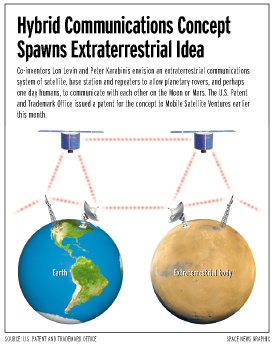Space Communications Patent Spans Solar System

WASHINGTON- When Mobile Satellite Ventures was issued the first-ever U.S. FederalCommunications Commission license in 2003 for its concept of creating hybridsatellite and ground-based communications systems, the company already had beenworking on a slew of related inventions it planned to capitalize on.
So far, 25of about 100 inventions have been approved by the U.S. Patent and TrademarkOffice, the most recent of which includes a hybrid communications system formultiple rovers - or eventually humans - exploringthe Moon or Mars.
Theinventions are based on Mobile Satellite Ventures? Ancillary TerrestrialComponent (ATC) concept of combining satellite signals with signals fromterrestrial repeaters for two-waydata and voice communication.
?Thefundamental concept of the ATC has created an opportunity for significantinnovation,? said Peter Karabinis, senior vice president and chief technologyofficer with Mobile Satellite Ventures of Reston, Va.
In earlyOctober, the company received three patents. By mid-November it expects to havereceived three more, Karabinis said.
The mostfar-reaching of the innovations is a concept for establishing an extraterrestrialcommunications system that, among a variety of scenarios, envisionsa satellite orbiting another planet, a base station on that planet andrepeaters to relay data to different points on the planet or back to thesatellite. That extraterrestrial network also would be able to communicate withEarth-based ground stations and a satellite orbiting Earth.
Lon Levin,co-inventor, with Karabinis, of the extraterrestrial communications concept,said the idea was hatched in 2004 after a visit to NASA and a discussion aboutthe Spiritand Opportunity rovers that landed on Mars in January that year.
Get the Space.com Newsletter
Breaking space news, the latest updates on rocket launches, skywatching events and more!
?When wegot back to the office, we imagined a future architecture that would enablecommunications as we expanded our presence on a planet,? said Levin, then asenior officer with Mobile Satellite Ventures who also had co-founded XMSatellite Radio. ?This architecture would not only provide efficientlyexpandable communications on the surface of a planet, it would also provide anefficient and effective means to have many simultaneous communications betweenEarth and other planets.?
Karabinisand Levin applied for the patent in April 2004.
Karabinisacknowledges the concept is futuristic and not likely to materialize anytimesoon, but he said parts of the innovation might be applied sooner toEarth-based communications. Mobile Satellite Ventures is seeking to expand theextraterrestrial communications patent to Earth-based systems, a process likelyto take two years, he said.
One exampleis their concept for an extraterrestrial communications system that would havethe ability to sense what frequencies other nearby ATC components are using inorder to avoid interference. These adjustments currently are done manually inEarth-based communications systems.
?With thesetweaks that we incorporate into the space-based mutation, if you will, of theATC, it is now becoming apparent - after the fact - that they may haveterrestrial value as well,? Karabinis said.
MobileSatellite Ventures received two other patents in October, one for a signalprocessing algorithm that will reduce the processing time for GPS positionlocation, whether or not ATC is involved, and another for the technique used inthe handover from satellite to a terrestrial receiver without interruption tothe user.
To Levin,who left Mobile Satellite Ventures in 2005 and now is president ofSkySevenVentures in Washington, which helps develop primarily space-based newtechnologies, the extraterrestrial communications patent symbolizes innovationthat could energize the commercial space industry.
?A key toour future in space is creating a commercially sustainable economy in space,?Levin said. ?By allowing patents such as ours, the United States is takinganother step toward that goal. I hope more will follow.?
- Video - Scientists Ponder Mars Rovers' End
- Video - Fireball Falls Toward Earth
- Video - Moon Probe Catches Full Earthrise!
Join our Space Forums to keep talking space on the latest missions, night sky and more! And if you have a news tip, correction or comment, let us know at: community@space.com.
Becky Ianotta is a former SpaceNews reporter covering space industry and policy news from 2008 to 2009. Becky earned a bachelor's degree in English/Journalism from the University of Miami. She spent five years as an editor with the Key West Citizen in Florida before joining the SpaceNews team. She later wrote for Air Force Times before taking her current position as communication director for Mother's Against Drunk Driving.









